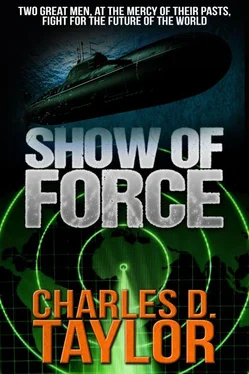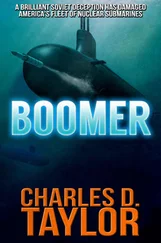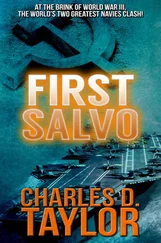"I've already arranged to have her stand off, Admiral. But I'm afraid we can't make a direct transfer. It's too dangerous for California to move that close." His face was sad and serious. "We're going to have to go over the side, sir. She'll have her whaleboat nearby to pick us up."
"Fine, Bill. Thank you." Again Nimitz shifted more heavily to starboard as tons of water continued to pour into her innards. "Where is the XO?"
"He's standing by DC Central. He's waiting for your order to abandon ship. He doesn't want to give it until you're safely off."
"Then let's get the hell out of here."
"Do you want anything from your cabin, Admiral?"
"Yes, I guess I do.… No, forget it. Don't waste any time. The sooner we're gone, the sooner they can abandon ship. Tell the XO I definitely do not want him staying aboard. Give him orders to report to me on California as soon as every sailor is off." He paused for a moment. "I don't want her to have a slow death, and I don't want them to do it. We'll sink her ourselves."
There should have been joy aboard Lenin. They knew they had delivered Nimitz to Gorenko, that it was just a matter of time before the great ship went to the bottom. But Lenin, too, was hurt, badly hurt.
The concentrated attack on Nimitz had left the Soviet carrier more open to the Americans than Kupinsky preferred, but he had known that there was no choice, that they could not achieve their objective as long as Nimitz was afloat. A flight of Corsairs had been badly decimated before it came within range of the Soviet carrier, but three of them had gotten through with their missiles. One had actually been able to deliver a five-hundred-pound bomb that knocked out the forward missile launchers.
Of more importance were the American submarines Omaha and Groton. Earlier in the day they had very quietly maneuvered themselves into the line of advance of Kupinsky's force. They remained below the thermal layer, using the sudden temperature change to camouflage themselves from the aircraft flying protective ASW cover in front of the advancing ships. Their torpedo tubes were loaded with Harpoon missiles, quite capable of accurately hitting a surface target at sixty miles.
The submarines used their on-board computers to analyze the sound signatures of the surface ships. Stealthily, they isolated Lenin and the other major ships they wanted as targets. No sound transmissions were ever exchanged. Earlier planning pretty much obviated that, and their CO's realized it really didn't matter if they happened to hit the same target. They would just be doubling the chances of sinking it.
That was exactly what happened to Marshal Grechko, the newest guided-missile cruiser in the fleet. Omaha's first missile hit amidships, right at the waterline, ripping a huge hole, tons of water instantaneously filling her engine room. Groton's Harpoon detonated in a missile storage compartment, the force of the explosion slashing upward to smash the bridge. Fires swept out of control through the forward section as Grechko heeled rapidly to port. The flames were blown back along the deck, driving the fire fighters amidships. One of her radiomen had just begun to call for help when an exploding magazine sent shells bursting into the space. He never delivered his message. This explosion also forced the men on the hoses back farther, though they hoped they might gradually control the fires and move forward to help their comrades trapped in the bow. The final blow was delivered by a damaged Corsair about to ditch. Her pilot, as he streaked low over the water, nipped his five-hundred-pound bomb just behind the stack, destroying the engine room. Lucky to survive the blast, the fire fighters now found themselves with flames behind them also. Their only chance for survival was a wall of water between them and the flames advancing from the bow and the stern. And then the water pressure dropped until there was only a trickle. In less than five minutes, what remained of Grechko's crew abandoned ship.
Zhdanov was also hit by an Omaha Harpoon, followed by the first of the American surface-fired missiles. The leading Soviet ships had more missile launchers than their attackers, but not quite the range. With a lack of air cover to deter the American ships, the Russians were forced to protect themselves before they could establish a surface-missile attack of their own. The combined hits on Zhdanov were too much, her midships' section burning fiercely and her rudder jammed to starboard. Fire-control parties were unable to halt the flames as the circling wind blew from a variety of directions. Her bow was filling and crackling bulkheads signaled the approaching end. A Kashin destroyer came close aboard to take on survivors.
Groton was the first of the subs to hit Lenin. The initial Harpoon struck aft of the bridge in the superstructure, damaging the carrier's computer center. The second hit forward of the bow missile installation, just ahead of the launcher bombed moments earlier. The detonation of magazines was the first sign the Lenin had been seriously hit.
At the time, Svedrov had said, "Our attack on Nimitz is progressing, Admiral. She has taken a number of hits, but I don't believe any fatal ones yet. Do you want me to release the torpedo boats for attack?"
'fifes, Svedrov, I think you'd better." They felt the rumble of an explosion in one of the forward magazines. "As you will note, they have not overlooked us."
Svedrov had the same feeling his Admiral did. Their fleet had more weapons than the Americans, but their sophistication and range might not be quite competitive. It was a necessity to sink the Nimitz to equalize the battle, but there was no point in being a winner if your own force was too decimated.
Alex Kupinsky watched the screens closely in front of him. His aircraft were inadequate to protect his ships. It was a matter of having more small carriers to spread over the ocean, for the airpower was still a controlling factor. He would have few aircraft or pilots left after this day was done. When he returned to Moscow, he would hammer home this lesson well. More shipyards would be converted to building many of the small VTOL carriers.
His own status boards reflected much the same information as David Charles's. Sunk: cruisers Azov, Vasili Chapaev, Marshal Voroshilov, Admiral Izakov, destroyers Bravy, Bedovy, Zorky, Strogy, Smetlivy. They were names etched in Russian hearts and minds, and their brave men would be missed. Countless statues would be erected in city squares to a new generation of heroes.
A third Harpoon plowed into Lenin, this time from Omaha. It hit just below the after section of the flight deck on the starboard side, exploding inside the hangar near the number-six elevator used for hoisting explosives. Ammunition was being loaded at the time, and that, too, began to detonate as the flames spread. If the explosions had been confined to a single area, the fires might have been contained, but rockets were being prepared at the time for the last flight of Forgers. Set off by the intense heat, they streaked wildly through the huge hangar, striking other aircraft and igniting their fuel. Damage-control parties were unable to enter. Bulkheads collapsed as explosions penetrated into adjacent spaces. Kupinsky was soon notified that the fires in the after hangar deck were out of control. The smoke filtering into his flag plot was already making breathing uncomfortable.
"Admiral, our reports indicate that Nimitz has been crippled. One more air strike will sink her."
"Svedrov, there is no doubt in my mind that you are correct. Yet, right now I can't launch another strike. We have almost no Rigas or Forgers left. We have fires in the aft section of the hangar deck that are out of control, and ammunition is exploding so fast that I could only arm the few aircraft I have up forward. The ammunition would have to be carried by hand, but we need every man available to fight the fires. We have succeeded with Nimitz." He took a deep breath. "She will either sink or David will torpedo her himself. But we are close to losing Lenin, also. And look at the losses already on that board. What have we won?"
Читать дальше












